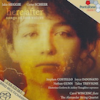
In the simple but emotionally potent conceit of For a Look or a Touch, one of the two characters speaks his lines and the other sings. The gulf that lies between these anguished, long-lost gay lovers is time.
Based on a true story, composer Jake Heggie and librettist Gene Scheer’s 2007 theatrical chamber piece reunites Gad (actor Curt Branom) and his partner Manfred (baritone Jarrett Ott), who died at Auschwitz some 60 years before the present action of the piece. Commissioned by the Seattle-based Music of Remembrance, an organization devoted to Holocaust themes, the 45-minute work is available for streaming through July 26.
At one level, Look is a ghost story. Arriving on a carpet of stage fog, the still youthful Manfred summons the gray-haired 70-something Gad to “Remember.” Understandably unsettled, Gad resists this apparition of his beloved partner from the past. An oscillating string figure and pensive clarinet underscore his uneasiness.
“You’re not going away, are you?” the older man says in a sulky pout. “You won’t let me forget,” he barks a few moments later. An insistent cello ostinato confirms that this ghost intends to stay and have it out.

Gradually, with his warm baritone and vigorous broad-shouldered bearing, Ott’s Manfred begins to reawaken Gad’s memories of a free and easy Berlin before Hitler came to power. “Remember,” Manfred coaxes, “when night was for more than sleep.”
Buttressed by period projections in director Eric Parce’s production, a raucous, seductively jazz-inflected number summons the atmosphere of the musical Cabaret’s Kit Kat Klub. The musicians in conductor Joseph Mechavich’s five-piece onstage band break free and interact with the performers. Boundaries were breaking down then. Everything seemed possible. Heggie throws a brief but buoyant musical party.
Darkness, of course, lurks around the corner, with the Third Reich’s hammer-dropping policy, enshrined in “Paragraph 175” of a Nazi document, to arrest and exterminate homosexuals. (Part of Scheer’s dialogue is drawn from a 2000 documentary about the crimes, directed by Rob Epstein and Jeffrey Friedman. Manfred Lewin’s journal is another source.)
This hybrid opera/drama reaches its moving peak in a gorgeous aria, “A Hundred Thousand Stars.” In a languorous tango, Manfred spins out an ardent, bittersweet blend of memory and hope. Scheer’s lyrics, which verge toward cliché in spots, are keenly understated here. “A train is passing by,” goes one fleeting line, which conjures the brutal transport of prisoners. Later on, when Manfred imagines a sky filled with stars again, the lens widens. Here is an assertion of gay struggle and liberation that stretches from the 1940s to the present day,
No sooner has that dream been seeded than it flies apart, in a thrusting, angular passage that recalls the degradation and monstrous cruelties of the camps. A mordant waltz, stretched out in 6/8 time, is another one of the pungent musical ironies in Heggie’s varied but tightly woven score.
This concise work has a certain static quality built in. Gad, shuttling between a couch and wing chair, does a lot of listening to Manfred’s fluid musical lines. It’s a challenge for an actor to make silence count; Branom falls into the trap of mugging and overplaying his reactions at times. Scheer’s libretto delivers a dramatic turn near the end, well played by both performers, that heightens the stakes. A piano and string storm quickens the impact. Viewers should discover it on their own.
The prolific Heggie, whose full-length operas include Dead Man Walking, Moby-Dick, and It’s a Wonderful Life, does fine work here. His skill at mining small musical motifs for rich rewards gives For a Look or a Touch, which might have come off as slight, an absorbing blend of urgency and delicacy.
The stars that shimmer onstage near the end bring Manfred’s opening line full circle. “Remember,” he sings as he starts to venture back into the past. And then he turns for one last, starlit dance with the present.




